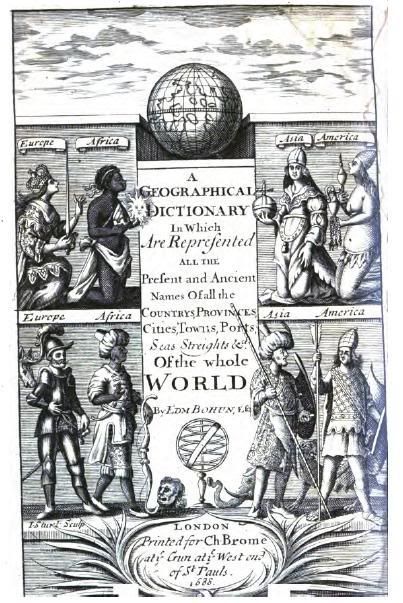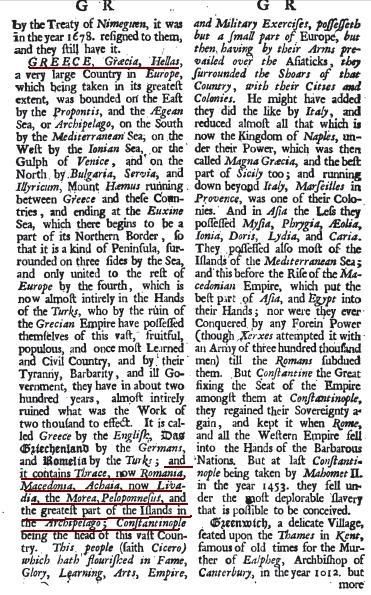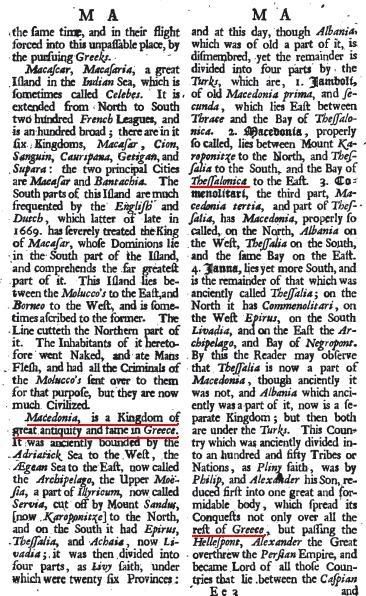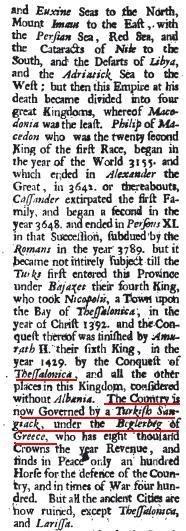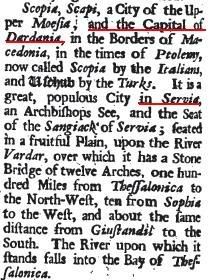Q9) "Hellas" and "Macedonia". When was the first time that the word Hellas was used to describe the country inhabited by people belonging to Hellenic (greek) tribes?Although the words Hellas and Hellen (and the other two English equivalents Greece and Greek) have been used to describe the country and the people of modern day Greece, their use in ancient times differed in various periods of time.
The usage of these words to describe the various hellenic tribes as a whole was unknown to the people of the Homeric poems. In Iliad, the words Hellen (Gk: ELLHN) and Hellas (Gk: ELLAS) defined a small greek tribe and the land inhabited by them in Thessaly. (Iliad B' 683)
"OI T' EIXON FUIHN HD' ELLADA KALLIGYNAIKA, MYRMIDONES DE KALEYNTO KAI ELLHNES KAI AXAIOI".
At some earlier line (B' 530) there is a reference to the word "PANELLHNVN". This word since the time of Aristarchos has been considered to be absent in the original poem and was added at some later time.
Plutarchos (Lykourgos 6) wrote about the message brought from Delphoi to Sparta by Lykourgos "DIOS (S)ELLANIOU KAI AUHNAS (S)ELLANIAS IERON IDRYSAMENON...". Because of this reference, it is believed that the words "Hellas" and "Hellen" became more widely used after the dispersion of the Dorians. It is also possible that they were sacred words possibly related to the (S)elles priests of the Dodonian Zeus.
[the parenthesized (S) is to mean that the S say in the word SELLANIOY was later dropped from use thus giving ELLANIOY.]
The words Hellas and Hellen became more widely used some time in the 8-7th century BC and in the 5th century BC we find the first references of them to describe the lands and the Greek people living south of river Peneios. In the 4th century BC and later they were also used to describe the various hellenic (greek) tribes as a whole. The passage from Herodotos (I,56), mentioned in a
number 8 question indicated another use of these words, that of distinguishing Ionian Greeks from Dorian Greek.
Since the Macedonians were pretty much isolated from the Greeks of Southern Greece up to the early 5th century BC, the words 'Hellas' and 'Hellen' were not used by them to describe collectively the lands of various hellenic tribes, as this was also true for all the other greek tribes until the 8-7th century BC.
Hence when the Macedonians initiated contacts with other Greek tribes they continued to use the word 'Macedonian' to describe themselves instead of the collective 'Hellen(es)'. This is the reason various authors (such as Isocrates, Philippos 154) use the term "Hellenes" and "Macedonians" on the one hand and 'barbarians" on the other to distinguish the greek tribes (of Macedonians and other Hellenes) from the non-greek ones (barbarians).
The intellectual Athenians of the 4th century gave yet another definition for the word "Hellen" (Isocrates, Panegyrikos 50), that of the person having an Athenian educational background, "... the name 'Hellenes' suggests no longer the people but an intelligence, and that the title 'Hellenes' is applied rather to those who share our [note: the 'our' refers to the Athenians] culture than to those who share a common blood".
It is also believed (N.G.L. Hammond,page 6) that the distinction made by authors of Macedonians and Hellenes differentiates only the descendants of Hellen from the descendants of Thyia, as in the genealogy provided by Hesiod. According to Hesiod, Deucalion had a son Hellen and a daughter Thyia. The ancestors of Hellen were Dorus, Xouthus (whose son was Ion) and Aeolus. Thyia had two sons Magnes and Macedon. According to Hellanikos on the other hand, Macedon was a son of Aeolus.
Q10) Was the Macedonian tongue a greek dialect or not?Yes it was a greek (doric) dialect.
We shall break this discussion into two parts. The first one consists of evidence found prior to the excavations in Vergina by the late Professor Manolis Andronikos. The second one consists of evidence found mainly since then. This evidence leads beyond any doubt to the conclusion that the Macedonians spoke a greek dialect which was basically a doric one, it borrowed words and was influenced by the aeolic dialect spoken by the Thessalian neighbours of Macedonians, and also borrowed few words of Phrygic and Illyrian origin.
The Thessalian (aeolic) influence convinced some researchers that the genealogy of Makedon given by Hellanikos
(see Question 3) was more accurate than that given by Hesiodos.
In the volume "Macedonia: 4000 years of Greek history and civilization" Professor M. Sakellariou examined the words known to be unique in the macedonian dialect of greek and related their root to the roots of words of other Greek dialects. Summarizing, many of the words that were previously considered of non-Greek origin were also in (rare) use in other parts of Greece.
There have been made various claims that the Macedonians up to some time in the 4th century BC used to speak a non-Greek language and at that time (around 340BC) were 'hellenized' by the Athenians and thus learned how to speak the attic dialect. These claims can be easily proved to be totally false even if one uses only pre-Vergina evidence.
Below we present various views on the topic.
Pre-Vergina evidence. Fr. Sturz (in "De Dialecto Macedonica et Alexandrina", 1808) concluded that the Macedonian tongue was a greek doric dialect. August Flick, O. Hoffmann, Otto Abel, and Karl Belloch, as well as Georg Busolt, Fritz Geyer, Ulrich Wilcken, Helmuth Berve, Gustave Glotz, P. Roussel, P Pouquet, A Jarde, R Cohen, J. Bury, St. Casson, W. Heurtley, D. Hogarth, J. de Waele, just to name a few (non-Greek) historians and archaeologists, shared the same views.
On the other hand, there were some historians and writers such as M. Vasmer (Revue du ministere d' instruction publique de Russie, 1908), P Kretschmer and Bulgarians G. Kazarow and Vlad. Georgiev that rejected this thesis. Georgiev attempted to show that Macedonians were member of a Thracoillyrian nation thus speaking illyrian, a non-greek language. That this was not the case was shown in
Question 6. G Weigand also shared the opinions of these authors. G. Hatzidakes rejected these theses in various texts and among them in "Zur Abstammung der alten Makedonier (eine ethnologische Studie)". For more details we refer to Daskalakis (page 104).
Coins found in Macedonia have inscriptions in greek and are dated from the early 5th BC century. Such found coins are the following ones.
- An octadrachm of Alexander I (circa 478BC).
- Coins from the reign of Archelaos (413-399BC) and Amyntas III (393-370BC).
- the ring of Sindos with the word Gk:'DVRON' (Gift) dated around 480BC.
These coins are dated well before 340BC, the time of the alleged "hellenization" of Macedonians.
Macedonians had their own month names. If one accepts the thesis that Macedonian were 'hellenized' by the Athenians some time around 340BC hen one can safely assume that these names must be identical to those used by the Athenians. If not, they would show the linguistic roots of the Macedonians prior to their alleged who claimed that Dorians and Macedonians belonged to the same tribe (Herodotos claimed that the Macedonians who descended to southern Greece after crossing Doris became known as Dorians) and thus Macedonians were a Greek tribe, the month names of Macedonians were Greek and were different from the ones used by the Athenians. The list of these names used by the Macedonians and the list of month names of the Lacedaemonians (who were Dorians) have a common intersection, the names Artemisios and Apellaios.
Persians when first occupied Macedonia during their conquests in Europe around 510-480BC described the people living in Macedonia as "The Greeks wearing a shield-like hat" and who were non other than the Macedonians themselves. This incident occurred long before the alleged "hellenization" of Macedonians.
It is believed that the worship of the 12 Olympian Gods had started in Macedonia (as related to their place of "residence". Mountain Olympos is located in Pieria and both these names are Greek. It is claimed the magnificent view of Mt. Olympos when viewed from Macedonia, while its view from the south (Thessaly) is hindered by other mountains, inspired the Macedonians and from the the other Greeks to consider this mountain the residence of their Gods.
Athenian comedies used to make fun of the idioms and the dialects of other Greeks like those of Spartans, Boeoteans and of course Macedonians. Some time in the 5th century BC a comedy entitled "Pausanias or Macedonians?" written by the Athenian Strattis was played in Athens. In various parts of this comedy a Macedonian explains how various words of the attic dialect are called in the Macedonian dialect.
It can be inferred from these references that Macedonians spoke a Doric greek dialect. In a work of the ancient writer Athenaios, one can find samples of the work of Strattis. In an article written by A. Koerte quoting Athenaios VII,323b we can find in that comedy of Strattis the following conversation:
"STRATTIS GOYN EN MAKEDOSIN EROMENOU TINOS ATTIKOY VS AGNOOYNTOS TO ONOMA KAI LEGONTOS: H SFYRAINA D' ESTI TIS;" FHSIN O ETEROS " KESTRAN MEN YMMES VTTIKOI KIKLHSKETE".
In English (as it appeared in the article by M. Sakellariou) an Athenian asks "sledfish, what do you mean?" and a Macedonian replies "wha ye Attics ca' a hammer-fush, ma freen" i.e. in my own words, which i hope do not change the meaning of this phrase "what you Attics call a hammer-fush, (we call a) freen".
One can appreciate the value of the Macedonian's reply for the object under discussion if he does not forget that as is clear from many passages in Aristophanes the attic comedians made their non-Greeks speak broken Greek with an a mixture of barbarian words (some of them imaginary) while Lacedaemonians, Boeotians, Macedonians and other Greeks spoke their own dialects. The Macedonian's reply is in good Greek with dialect (ymmes, sfyraina) and archaizing elements (kiklhskete). Both YMMES and SFYRAINA are not attic words but they are Greek. Therefore claims that Athenians "hellenized" Macedonians seem to be baseless. It is also noted that these words were used by the Macedonians some time in the 5th century BC that is at least 50 years before their alleged hellenization.
An ambassador from Macedonia speaking to the Aetolians in 200BC observed that the Macedonians, the Aetolians and the Arkanians all spoke the same language.
The expressions "aneboa makedonisti", "makedonisti th fvnh" have been taken by opponents of the thesis that the Macedonians were Greeks as indicating that their language differed from Greek. One can claim that these formulation indicate a Greek dialect (cf [In Greek] "aiolizein th fvnh", "attikizei", "attikisti", "boivtiazein","dvrizein" etc).
To those who are more interested in the characteristics of the dialect of Greek spoken by the Macedonians the article by M. Sakellariou in "Macedonia: 4000 years of Greek history and civilization" is available on request. In general few words of non-greek origin were used in the Macedonian dialect of greek an most of these words were proper names. Some of them were names of Egyptian deities worshipped in Macedonia after the 3rd century BC. Even in the times of Herodotos (II 153, III 27, IV 155, VI 27) barbarian (non-greek) names were in use by Greeks. Strabo VII 7,1 (C321) also mentioned various names of non-greek origin such as KEKROPS (Greek: KEKROC) KODROS, AIKLOS (Gk: A.I.KLOS), KOTHOS (Gk: KOUOS), DRYMAS (Gk: DRYMAS) KRINAKOS (Gk: KRINAKOS).
It should also be mentioned that many place-names in ancient Macedonia (and modern-day Macedonia of Greece) are of Greek origin and of use in other areas of Greece as well. Such names are: Argos (Gk: ARGOS), also found in Thessaly and Peloponnesos. Arnissa(Gk: ARNISSA) reminds of Arnen (Gk: ARNHN) of Thessaly and Boeotia. Arethoussa (Gk: AREUOYSSA) also found in Ithaca, Boeotia, Syracuses. Prasias a lake and a city name is also found in Athens as PRASIAI, and many other ones (such as Oedomenae, Petra, Fila, Gortynia, Pynda etc).
Many other words of the Macedonian dialect are of ancient doric origin such as [the macedonian-doric and attic equivalent names are shown in Greek only]: santoria = svthria, zereuron = bereuron, barauron xarvn = xairvn arkon = argos dvraj = uvraj danon = uanon , uanatos kadaron = kauaron sarisa = dory (from the verb sairv, sarvnv) etc. Some other words of the macedonian dialect of greek can be traced back in the Homeric poems: amalos = apalos indea = meshmbrian ( indion hmar) leykanih = laimos lisson = omalon , leion (lygos = rabdos).
Fore more details see the work of Geyer Fr., where he showed that the names of macedonian months and festivities although they could not be found anywhere in classic Greece were archaic Greek ones and showed the doric origin of the Macedonians.
The fact that Macedonians participated in various celebrations like the Amphictyonies and the Phocica also show the belief of themselves and the other Greeks in their origin. It is for these reasons that Professor F. Papazoglou in "Historija Hellenizma", Belgrade, 1967 claimed that Macedonians were Greeks, a claim also supported by Heinz Kreissing in "Povijest Hellenizma", Zagreb, 1988.
Prof. Arnold Toynbee in "The Greeks and their Heritages", Oxford University Press, 1981 also claimed that ancient Macedonians were Greeks.
Post-Vergina evidence.The excavations in Vergina have brought to light many tombs that buried ancient Macedonians. There are inscription on these tombs with the names of the deceased person and those of his/her progenitors. All names found so far have been Greek. Given that some of these tombs are dated from the 350BC era, one can conclude that by some time in late 5th century Macedonians have been naming their children with Greek names. And since contacts with the Athenians were rare to non-existent at that time one can safely conclude that claims that Macedonians were not Greeks and were only 'hellenized' in the 4th century BC are false.
Published information on the excavations in Vergina is mostly in the form of papers submitted to various conferences.
Q11) "ANEBOA MAKEDONISTI" ?Those who claim that the Macedonians were not a Greek tribe considered this expression as evidence that the language of the Macedonians was a non-greek one. Previous questions
(Question 10) discussed the refutation of this thesis in more detail. A discussion of this phrase only will be dealt here. It is based on that of the book by Daskalakis (see references).
The expression "ANEBOA MAKEDONISTI" was first found in the works of Plutarchos (ALEXANDORS LI, 4) and that of the Latin Kurtius Rufus. The phrase is found in the following passage [ In Greek: ]
"TVN DE SVMATOFYLAKVN ENOS, ARISTOFANOYS, FUASANTOS YFELESUAI, KAI TVN ALLVN PERIEXONTVN KAI DEOMENVN, ANAPHDHSAS (cf Alexandros) ANEBOA MAKEDONISTI KALVN TOYS YPASPISTAS (TOYTO D' HN SYMBOLO UORYBOU MEGALOU), KAI TON SALPIGKTHN EKELEYSE SAHMAINEIN, KAI PYJ EPAISEN, VS DIATRIBONTA KAI MH BOYLOMENON..."
On the other hand Arrhianos, whose sources included lost works of Alexander's co-fighters and eye witnesses, describing this episode that resulted in the death of Kleitos used the following phrase: " ALEJANDROS DE EBOA ANAKALVN TOYS YPASPISTAS". No reference to MAKEDONISTI appeared in Arrhianos' version of the episode. This may lead to the conclusion that the word "MAKEDONISTI" was somehow added at some later time, or the interpretation that has been given to it by some translators was not the one intended by Plutarchos. It is also noted that references to the expression "Macedonia and the other Greece" are numerous in his work.
In Plutarchos' rendition of the episode the distinction between ANEBOA (called, shouted, roared) and KALVN (calling) is evident. Given the explanatory statement "TOYTO D' HN SYMBOLO UORYBOY MEGALOY" ('this was a sign of great noise') it can be concluded that ANEBOA referred to some kind of password used by ALEXANDER the Great to call his YPASPISTAS (sort of bodyguards) in cases of emergencies only, that is why its use caused great disturbance.
The absence of MAKEDONISTI in Arrhianos' rendition seems to agree with this interpretation. Let alone the fact that following this incident Alexander talked to his YPASPISTAS in attic greek. The expression "aneboa makedonisti", if this indeed appeared in the original text, is no more different from other similar expression "aiolizein th fvnh", "attikizei", "attikisti", "boivtiazein","dvrizein" which were used to denote various dialects of ancient greek.
A Latin writer Kurtius (other than the aforementioned Kurtius Rufus) gave a description of this episode similar to that of Arrhianos. No reference to MAKEDONISTI was made by him and he only wrote "that Alexander ordered via a trumpet call his soldiers to gather outside the royal tent".
There is another passage in the work of Kurtius Rufus describing the trial of Filotas which is being used by proponents of the thesis that the Macedonians spoke a non-greek language. Allegedly Filotas during his trial used the attic dialect forcing Alexander to accuse him of not using his (Filotas's) mother tongue (macedonian, supposedly a non-greek language).
Subsequently, Alexander also accused Filotas of being unwilling to learn how to speak his mother tongue! This passage contains several contradictions notwithstanding the one that Filotas was not capable of speaking his mother tongue. Alexander on the other hand, allegedly accuses Filotas of detesting the macedonian dialect but according to Filotas' reply this accusation is spelled by Alexander in the attic rather than the macedonian dialect! This fact alone, had this episode really happened, could have been used against Alexander himself as a counter argument and accusation. It is this reference to Alexander that made H. Bardon, publisher of Rufus's works to wonder how it was possible for Alexander to fall in such a contradiction and to accuse others of something that he himself was fighting for.
Neither Arrhianos, who lived closer to the era this episode occurred, nor Plutarchos present this incident mentioned in the work of Kurtius Rufus. H. Bardon, French publisher of Rufus's works (pub. Belles Lettres vol 1 page 201 note 1) commenting on the alleged speech of Filotas said that Kurtius Rufus was accustomed to rhetoric artifices and as a result historic truth suffered in that part of his work. All in all it can be safely concluded that this passage was more of a product of the rhetoric talents of Rufus thus attributing to Filotas a speech Filotas never gave rather than presenting the actual events. Writers who lived well before Rufus and close to the time of the incident were not aware of such a speech by Filotas.
Q12) There is a reference in a work by Pausanias that may give the impression that Macedonians, around 214-213BC, were speaking a non-Greek language.Advocates of the thesis that the Macedonian spoke a non-greek language claim that this language was spoken by them up to some time in mid 4th century BC. At that time Macedonians within few years were fully hellenized and since then they have been speaking Greek.
Long but relevant Parenthesis. Skip it if not interested: Some of these advocates accept a Skopjan point of view that all Macedonians perished and thus vanished when Slavs first appeared in the Balkan peninsula in the 7th century AD. All of a sudden these new Slavs became heir-apparents of the Macedonians, were granted presumably by Marshall Tito the exclusive right to be called 'Macedonians' and named the Bulgarian idiom also consisting of Greek, Turkish, and Albanian words formed at least 1000 years after their descent to the Balkans "the Macedonian language".
Some of them, possibly all, claim that this Slavic origin language was the language spoken by the Macedonians before the the Cyrillic alphabet was introduced to these and other Slavs along with many greek words by two Macedonian (Greek) brothers, Kontantinos (later called Cyril) and Methodios from Thessaloniki. It is quite interesting to know how these Macedonian brothers escaped the fate of other fellow Macedonians and didn't perish during the descent of Slavs in the Balkan peninsula, as the advocates of Skopjan claimed that it had happened.
According to Pausanias (Messenians IV 29, 1) the residents of Messene a night around 214-213BC first thought that the Lacedaemonians had attacked them. Later, by the arms and the voices, realized that those who attacked them were soldiers led by king Demetrios. Since at that time a Demetrios was King of Macedonia, it was assumed that the attackers were Macedonians. Some authors claimed that the 'voices' reference was to mean that the Macedonians (attackers) were speaking a non-greek language at that time, an argument not accepted for the Macedonians of that time by almost everyone.
Later on, it was realized that the Demetrios in question was not the king of Macedonia, son of Philippos E', but Demetrios the Pharian, an Illyrian, who was later killed during this campaign against Messene.
Frequently Asked Questions on Macedonia compiled by Alexandros Gerbessiotis
